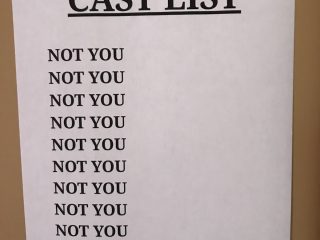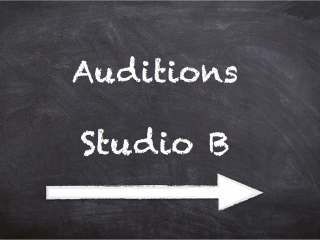In the last few years, cabaret shows have swept the musical theatre world by storm in both New York and London. Popular venues like 54 Below and Crazy Coqs regularly host intimate evenings to showcase popular guest stars or reimagine favourite songs. Because of their paired back nature, they have become a great way for performers to hone their craft, or even better, create work for themselves. But there are a lot of logistics and that can be overwhelming! We’re here to help. If producing and writing your own cabaret has ever piqued your interest, read on for the best tips and tricks to make that happen!

What Are You Trying to Say?
Let’s start at the very beginning. Ask yourself a few questions. What kind of cabaret am I hoping to create? Do I want to tell a story? Do my songs need an overarching theme to them? Am I trying to showcase a specific type of performer? Perhaps you are creating a cabaret to highlight people from a certain country, or to emphasize body positivity. Maybe you want to share your personal journey through song. It is important to have a good understanding of your “why”. If you don’t know why you are creating a show, and what you are trying to give your audience, your whole concept may end up being vague and murky. Perhaps start by brainstorming different poster taglines. Though this will probably change as your cabaret evolves, it allows you to narrow down the message you want to deliver and will give a clearer path ahead while making decisions. Understandably, story-based cabarets will require more planning than stand-alone songs with a common theme, but both have their pros and cons.
What Show Structure Will Best Serve My Cabaret?
Once you have decided on your “why”, you will be in a better position to structure your cabaret. If you are telling a story, you might need to write a script to tie each song together and create a well-rounded start-to-finish journey. Once the script is written, you can assign different lines to various actors or book a host to be responsible for most of the talking.
If your goal, for example, is simply to showcase the best female performers on the West End, it might be sufficient to only introduce each performer by name with their song of choice.
How Many Performers Do You Want?
There are many options here. At its smallest, cabarets can be a solo journey, with one person at the mic the whole time. This is often the case for bigger names who have had more experience in the theatre. Though this might be slightly simpler to plan logistically, remember that in this format, the one solo performer is now responsible for the entire show. If you are just starting out, it might be difficult to fill your entire venue on your own and it is a big responsibility to carry an entire cabaret alone.
Alternatively, you can recruit or audition other performers to join you on stage. Having three to four performers can still feel intimate but will help you sell more tickets. You now also have the luxury of group numbers, duets, and trios to add variety to the show structure.
If you are hoping to highlight a certain demographic, you might want to create a cabaret with 10 or more performers, with everyone singing one or two solos. Imagine your poster tagline: “showcasing the best female performers on the West End!”. Logistically, this might be simpler to plan. You cast ten women; everyone individually prepares their own material and shows up to sing them on the day. The number of performers you need will really depend on your “why” and what best serves the story you are trying to tell.

What Is Your Budget?
This is a huge category, so let’s break it down further.
Paying Your Performers – If this is your first venture into cabaret producing, the budget may be very small. Are you paying your performers? Though that should always be the goal, it isn’t always feasible. Be very clear with your cast from the very beginning. Some artists will be happy for the exposure, while others won’t want to give their time for free. Both opinions are valid.
The Venue – How much will the venue cost? Ask yourself: realistically, how many tickets can I sell? If the answer is around 50, don’t book a venue that seats 200. The space will feel empty, which will affect the atmosphere on the day. The trick is to find that sweet spot of a venue that seats enough people but doesn’t cost a fortune. Additionally, some venues will offer more within their packages like equipment, technicians, or booking fees. Make sure you understand the full scope of what each theatre has to offer and compare the bigger picture, not just the initial quote. Location can also be a big factor. Make sure the theatre is accessible and central. It’s a lot to think about and you will most likely reach out to many venues before you make an educated decision.
The Tickets – How much can I sell my tickets for? This is where the math becomes a bit more complex. If I sell my tickets for $15 each, but I need to spend $500 to pay for the show, how many tickets do I need to sell to break even? This is all dependent on the type of cabaret you want to create but does require forward planning, so the finances don’t catch you by surprise later on.
The Equipment – To produce a higher quality cabaret, you will most likely need technical equipment. Make a detailed spec sheet, listing how many microphones you will need. If your cabaret is to track, you will need a good PA system to play them. If you are using an accompanist, do you need to source a piano and an extra speaker? Many theatres will provide these services within the cost, but it is not guaranteed. Is it cheaper to use the theatre equipment or hire your own? When planning your budget and venue decisions, these are important factors to consider.

Marketing – Discussed in more detail further on, it is important to decide if you want to dedicate any of your budget to advertising your show.
Do I Need Any Additional Crew?
Of course, it isn’t only the performers you need to think about. If you are performing in a more traditional cabaret theatre, you will most likely, at minimum, need a sound and lighting technician. Some venues will offer their crew at an extra cost, others will tell you to source your own. Make sure to include them into your budgeting costs. Be very clear of your needs when you hire them. Will you need them for a rehearsal, or just the show? Do they need to create any specific look or sound, or are you happy with a more generic set up? The clearer you are with your expectations, the more cohesive the entire project will be.
If you are using a piano, you will need an accompanist. Just another thing to factor into your budget! Do you need them for just the show, or a rehearsal as well? Do you need an accompanist who plays musical theatre, or one that is open to some improvisation?
Front of house! If you are using a smaller venue, you might need to source an extra person to take tickets at the door or lead people to their seats. Are you paying someone or asking a good friend to help at the door? Once again, you’ll need to confirm this with each individual venue.
How Will I Market My Show?
Now that you have a show, you need an audience! Social media is an obviously easy and free way to promote your cabaret. Make a poster and put it everywhere! Make sure your poster includes the date, time, place, and ticket price to best give all the information in one place. Always include any relevant links to make the booking process as easy as possible and set reminders for those who might be forgetful!
Target the audiences you think would enjoy your theme and write to them personally so they can market for you as well. If you are featuring performers from a certain country, for example, reach out to other groups from that country, even if they aren’t musical theatre fans!
Ask your venue to promote your show on their website and ask others to spread the news. Word of mouth can be a game changer if taken seriously. Is there a local paper, radio station, or blog that could mention your show? If you have a large cast, ask every performer to bring along at least two people. Invite agents, casting directors, and other actor friends. You have worked hard to create your show, so people should see it!














